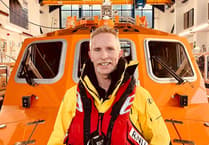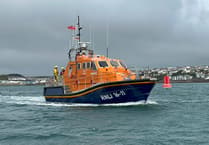Tenby RNLI have issued a fresh warning about the dangers of paddleboarding without taking proper safety precautions, after one person was left clinging to a danger zone marker buoy out to sea, after falling in the water late on a Saturday night.
Tenby’s inshore lifeboat was requested to launch at 9.10pm on Saturday, July 12, after the Coastguard received a call stating that two paddleboards with three persons on them looked to be making little headway back towards shore off Morfa Bychan.
The RNLI volunteer crew were quickly on the water and made best speed to Morfa Bychan, some 6.5 miles north-east of Tenby.
As they were getting closer, the crew spotted the two paddleboards about 1.5 miles offshore, but there looked to be only two occupants.
Once they got alongside, the distraught females, who were not wearing lifejackets and had no leash connecting them to the paddleboards, confirmed that the third person had fallen off and they had lost sight of him.
With light fading fast, the lifeboat crew immediately requested assistance from the all-weather lifeboat and after taking the casualties aboard, began a search for missing person.
Luckily, before the larger all-weather lifeboat had chance to launch, the inshore lifeboat crew spotted the third casualty, who also wasn’t wearing a lifejacket, clinging to one of the military danger zone marker buoys, about 0.5 miles closer to shore.
Once he was aboard, and checked over in case he needed medical assistance, all three casualties were taken back to Morfa Bychan.
The lifeboat then returned to station.
“We’d like to take this opportunity to remind people that when going paddleboarding, you should always wear the correct equipment such as a leash to keep you connected should you fall off the board, and also buoyancy aids, to help keep to afloat if you end up in the water,” said a spokesperson for Tenby RNLI.
The RNLI have been working with training agencies and National Governing Bodies to develop four things you should do every time you go out on the water.
Wear a buoyancy aid - A buoyancy aid, a type of Personal Floatation Device (PFD), will provide extra floatation in the water to help keep you afloat, but it will also help give you time to recover should you fall in – and chances are you will!
Carry a phone in waterproof pouch - in case in an emergency you need to raise the alarm.
Wear the correct leash - The leash will also help you stay connected to your board if you get into trouble and help you float.
Avoid offshore winds - Often with offshore winds the water looks idyllic and calm however this can be deceptive as offshore winds will quickly blow you and your paddleboard far out to sea, which can make it extremely tiring and difficult to paddle back to shore.
The following links have plenty of information to help keep you safe on the water: https://rnli.org/safety/choose-your-activity/stand-up-paddle-boarding and https://rnli.org/safety/float





Comments
This article has no comments yet. Be the first to leave a comment.